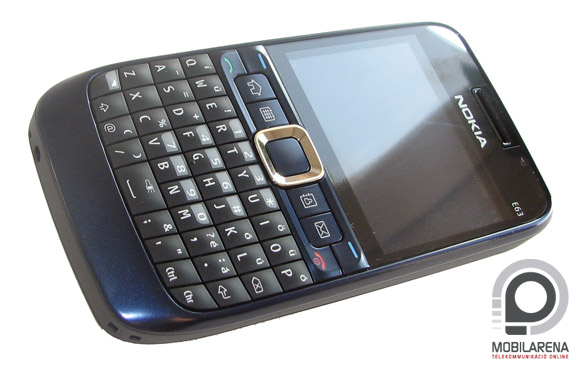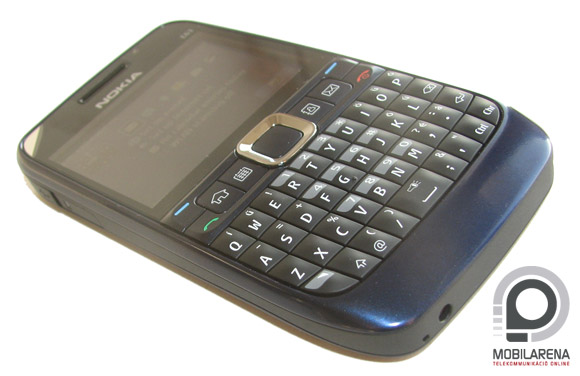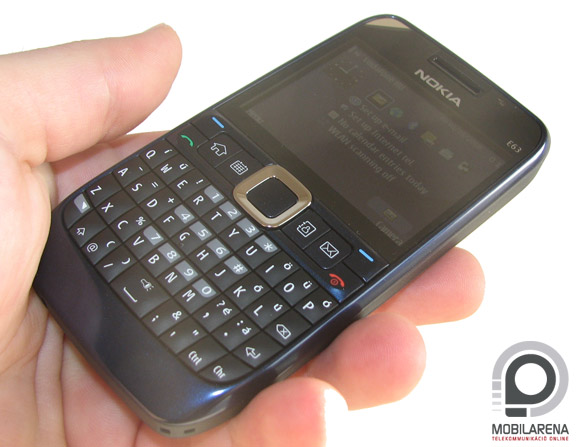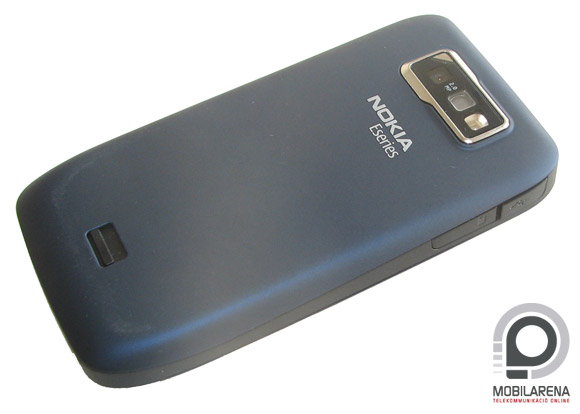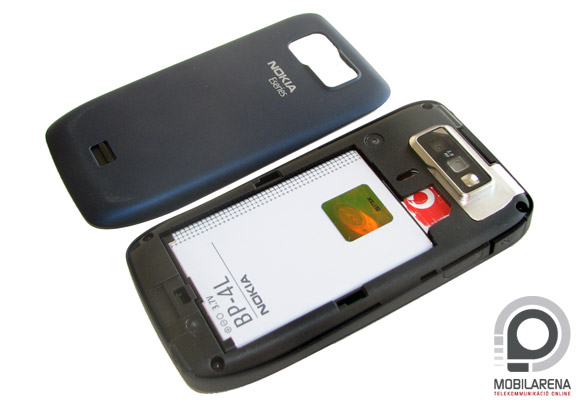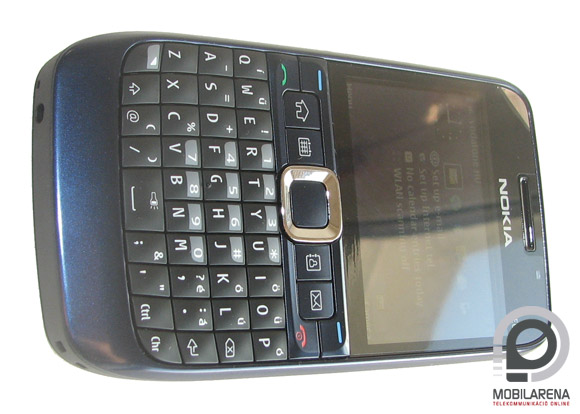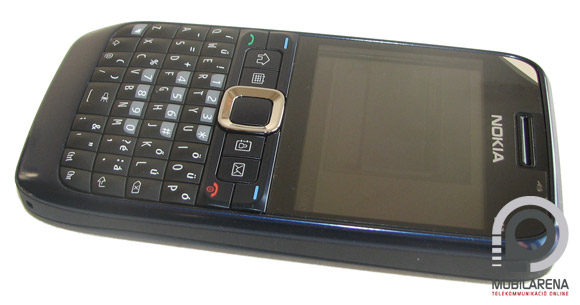Introduction
This model will be one of the most successful business phones of the year. I’d dare to bet two months of Bocha’s salary to that, but besides joking, Nokia E63 is a great one from the Finnish manufacturer. Until now things happened usually the other way: a fine phone has been launched, and a half a year later an updated version comes out with more features. And now we have this device, which is the “dumber” version of the otherwise successful E71.

The box that came from XXL GSM, didn’t have many things in it, there was a charger, a stereo headset and the phone. There is no memory card or USB cable, which is not very nice this way, but this might not be the most important for the user. But the price. E63 costs about 215 euros, which is not expensive at all, and this will be the key to its success. It’s more than 70 euros cheaper than the big brother E71, which is not just a slight difference, and Nokia has been very smartly editing out features, so we have a great phone for business customers who don’t have special needs.
I’ve read it somewhere in the forums that a user said that he would only need the operating system, the display and 3G from a given handset. But he feels that the camera, the GPS or the gyroscope are unnecessary and he doesn’t think it’s righteous to pay more money for these when he won’t even use them. He is right, and Nokia E63 will be so great because of this philosophy and now it will reach out not only to our country, but, due to the global crisis, to every one. Cost-effectiveness, this is the keyword.
Exterior
Now, let’s see the first differences. E63 is easier to recognize, as compared to the cold and elegant metallic materials of E71 this model is available in pastel red and blue colors. This also means that we can say goodbye to metal, everything is made of plastic here, but they have taken care of the surface, the handset is covered in soft plastics, even though this turned the back cover into a real dust-magnet.
When having a look at the size it might strike us that although it’s a tiny bit shorter (E71 has a pointed bottom), it’s also wider and about 3 mm thicker, but it’s still not too chubby, it fits an average hand very well. There is another difference on the outside, which is not to be neglected at all: E71’s 2.5 mm jack connector has been swapped out to the more wide-spread standard 3.5 mm one and it is now placed on top of the phone. This is great news, there is only one problem: this hole is covered by a small rubber plug, which will be the first (and probably only) part to be lost by the user in minutes, as it’s not connected to the phone at all.
Otherwise E63 is a clone of E71, the display diagonal is still 2.36”, it uses landscape QVGA resolution and the keypad layout is almost the same as on the predecessor. There have been no complaints about this until now, the embossed keypad is easy to use even in spite of the fact that the keys are crammed into a rather small area. The layout and functions of the navigation controls didn’t change, this is also all right. The only change is related to the space key, as it became smaller, as there are two extra keys near it and it also has a flashlight icon on it, which is no accident. By default, when pressing this key, the LED on the back turns on.
All buttons have disappeared from the sides. This might be my special aberration, but I just need volume control keys on the sides of a phone, as this is the handiest place. It’s real stupid to tamper with the navigation keys between my face and the phone during a call, and another thing one is looking for on the sides of a camera phone is the exposure key. Now there are only two doors on the left side of the handset, the first is for the memory card, while the other one is the microUSB port. The phone is charged via the good old Nokia connector on the bottom.
The camera on the back has an emphasized frame, which is rather unnecessary, since there has been some downgrade applied over here too. E63 has only a 2 megapixel fix focus lens, which could have been just a simple hole. Of course this doesn’t look bad, it just has no reason. The back panel can be easily taken off with a key and we’ll see a large, flat battery.
Interior
From here on we’ll try to resort to stuff that’s different from E71, since the internal structure of E63 is exactly the same as in the case of the big brother. Both gadgets have a 369 MHz Freescale CPU and 128 MB of RAM. This couple, and the Symbian 9.2 S60 3rd Edition Home Screen 1.0 system, means that E63 works fast, reliable and without problems during everyday life.
Just to make things clear let’s see this OS (with a cool long name) in a nutshell. I don’t think Symbian needs to be introduced, this is the OS of all Nokia smartphones. 9.2 is no the latest one, as we have 9.4 as well (on 5800), but this doesn’t make E63 outdated, it’s just different. S60 is Nokia’s platform, which is based on Symbian, the handset has the third generation of this. It has v5 as well, but that’s made for touchscreen devices. Home Screen 1.0, however, is a unique thing, it can be found on E66, E71 and this phone. The point is that when the third generation S60 platform came out, then first a Feature Pack 1, then a Feature Pack 2 has been released, which included additional features and patches. Home Screen 1.0 is somewhere between these two and it’s called this way because it has a feature that is not present on others. This is that we can switch between private (or home) and business modes with the press of a key, and this won’t change only themes and ringtones, but the active standby screen can be reorganized as well, for example the calendar can disappear and the FM radio can be placed in its place.

Besides this, E63 is a normal Nokia smartphone with the usual features and usability. I will not go into details regarding the phonebook and messaging, these didn’t change since E71 and this part can be read in the E71 review. The organizer features are also the same, the full version QuickOffice suite (it can edit files), the PDF reader and the mobile ZIP application are noteworthy.

There is no change in the music player either, although the lack of the volume control keys on the side makes its use a bit more difficult. The FM radio has no RDS, but otherwise it’s good. The calculator, the voice recorder, the stopwatch… everything’s the same as on E71 and there’s no problem with that.
Missing features
There have been downgrades in three serious places. The first is the camera, which has a resolution of only 2 megapixels and autofocus is missing. This can be seen on the pictures taken, of course, but let’s stop here for a second. Does Nokia think it wrong that for a business user, in case of such a handset, this is one of the least important factor? No. E71 is no photo phone either, some camera has to be included to capture sudden situations, this resolution is enough for such things. There are test pictures of course. Video recording is basic as well: QVGA resolution at 15 fps.
There is no GPS either. Of course this can be added later through a GPS receiver with Bluetooth connection, but then we have the same price as E71, as the software should be calculated as well, which is installed on the phone, but there are no maps with it. But there are probably quite a lot of E71 users who don’t use GPS at all, or they only try it out once, so the lack of this won’t hurt many people, and it also affects the price-tag in a positive way.

Another important thing has disappeared from the specs, and this is HSDPA. We still have “plain” 3G, probably Nokia engineers have thought that this speed will be enough for browsing on the phone and checking emails (3G-UMTS has a speed of 384 kbps, while HSDPA – at least in the case of E71 – works at 3.6 Mbps if we have proper network preferences). The built-in browser didn’t change, it has flash support, this Nokia also has an HTML browser with many features.

The handset comes with a kind of demo version of the Nokia Ovi service, which gives us 100 megabytes of free download from the manufacturer’s servers, which includes themes, applications, ringtones and games. I should also note, regarding games, that there are none installed on the handset.
Other stuff, summary
Otherwise Nokia E63 has everything a business user can expect. Fortunately they didn’t phase out WLAN, we also have Bluetooth and the battery is rather powerful, which is the same BP-4L (at 1500 mAh), which has been in E71. This means that in the specs Nokia mentions better standby and talk times, so some optimization has been applied probably. Based on my own experience I can say that E63 stayed online for three-four days with a charge, which is a nice performance from such a big guy.
The situation is – and I’ve already mentioned this in the introduction – that E63 has been a really smart choice from Nokia. They have done a great job selecting features to be omitted, those that are used only by a small part of users, and at the same time the handset’s price has been decreased to a friendly level. Of course they have committed a couple of mistakes, but none of these are serious, Nokia E63 can become a cost-effective choice for company leaders who are afraid of the effects of the financial crisis.
It has a couple of rivals, but not many. Samsung i600 is now outdated and Palm Treo Pro doesn’t have this many features (although I really like it), Asus M530w has about the same features, but WM’s non-touchscreen version might not be as user-friendly as the much more mature Symbian.
Great timing, great idea at a really acceptable price. I don’t think it needs further explanation why does Nokia E63 receive a Highly Recommended award.
 |
| Nokia E63 |
Bog
Translated by Szaszati
Nokia E63 has been provided by XXL GSM.
The handset can be purchased at:
Budapest VI. Jókai tér 6.
Budapest VI. Teréz körút 18.
On-line at www.xxlgsm.hu.
Specifications
| Nokia E63 | ||
 | General | |
| Technology | GSM, UMTS | |
| Size | 113 x 59 x 13 mm | |
| Weight | 126 grams | |
| Available colors | red, blue | |
| Display | ||
| Display diagonal | 2.36” | |
| Display resolution | 320 x 240 pixels | |
| Display type | TFT | |
| Number of colors | 16.7 million | |
| Memory | ||
| Phonebook capacity | dynamic | |
| SMS memory / max. MMS size | dynamic / 300KB | |
| Internal memory | 120 MB | |
| Memory expandability | microSD (max 8GB) | |
| Data transfer | ||
| Frequency bands | 850/900/1800/1900 MHz | |
| GPRS / EDGE | Class 10 (4+1/3+2) / Class 10 (236.8 kbps) | |
| UMTS / HSDPA | present (384 kbps) / none | |
| IrDA / Bluetooth | none / 2.0 (A2DP too) | |
| WiFi | present | |
| USB | microUSB 2.0 | |
| Push-to-talk / RSS | present / present | |
| GPS receiver | none | |
| Basic functions | ||
| Profiles | present | |
| Vibra function | present | |
| Built-in handsfree | present | |
| Voice dialing / voice commands | present / present | |
| Sound recording | present | |
| Alarm clock | present, also when turned off | |
| Predictive text entry | - | |
| Software | ||
| Platform | Symbian OS 9.2 Series 60, Home Screen 1.0 | |
| WAP / HTML browser | present / present | |
| E-mail client | present (POP3, IMAP4, Exchange, authenticated) | |
| Java | present, MIDP 2.0 | |
| Games | none | |
| Currency converter | present | |
| Extra software | QuickOffice, Adobe PDF, Zip, business card reader | |
| Multimedia | ||
| Main camera | 2 megapixels, fix focus, flash | |
| Secondary camera | present, CIF resolution | |
| Video recording | present, QVGA, 15fps | |
| Music player | present, can run in background | |
| Equalizer | present | |
| FM radio | present | |
| Battery | ||
| Main battery | 1500 mAh Li-Pol | |
| Standby time | 432 hours | |
| Talk time | 660 minutes | |
| Other | ||
| QWERTY keyboard | ||


